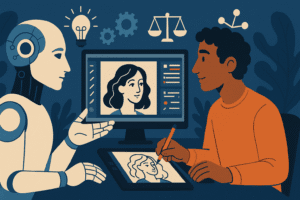
For more than two decades, the internet has had a universal front door. When you wanted to know something, anything you went to a clean, white page, typed a few words into a box, and hit ‘Enter.’ Google, and other traditional search engines, would return a neatly organized list of blue links, a digital library catalog pointing you to potential sources of information. This ritual is so ingrained in our digital lives that “to Google” has become a verb synonymous with finding things out. But a seismic shift is underway, a quiet revolution powered by artificial intelligence (AI) that is fundamentally challenging this paradigm. We are moving from an internet of links to an internet of answers, and this transition will change everything about how we interact with information online.
How We Navigated the Web of Links
To appreciate the magnitude of the current change, it’s essential to understand the genius and the limitations of the system we’re leaving behind. At its core, a traditional search engine like Google performs three colossal tasks: crawling, indexing, and ranking. Imagine it as a team of infinitely fast librarians building the world’s most comprehensive card catalog.
First, ‘crawlers’ or ‘spiders’ automated programs tirelessly travel across the web, following links from one page to another to discover new and updated content. They see websites not as we do, with polished graphics and layouts, but as raw code and text. They are the explorers, charting the vast, ever-expanding territory of the internet.
Next comes indexing. As content is discovered, it is analyzed and stored in a massive database called an index. This isn’t just a simple list of websites; it’s a highly organized library where information about the content and context of each page is stored. The index understands which words appear on a page, where they appear, and what other pages link to it. This step is what makes a search engine feel instantaneous; when you search, you’re not scouring the live internet but this pre-built, optimized index.
Finally, and most crucially, there is ranking. This is the secret sauce, the algorithm that decides the order of the links you see. Google’s breakthrough was PageRank, an algorithm that determined a page’s importance by looking at the quantity and quality of other pages linking to it. Over the years, this has evolved into a hyper-complex system with hundreds of signals, including the keywords you use, the freshness of the content, your location, and the overall authority of a website. The goal has always been to interpret your keyword query and present a list of the most relevant and trustworthy documents to answer it. The key word here is ‘documents.’ The system gives you a list of potential sources, but the cognitive load of reading, synthesizing, and finding the actual answer still falls on you, the user.
Your New Conversational Expert
Enter the new wave: AI-powered search, or more accurately, “answer engines.” Tools like Perplexity AI, the new AI Overviews in Google Search, and the search capabilities built into chatbots like ChatGPT are not just an evolution; they are a different species entirely. Instead of providing a list of links, they aim to provide a direct, synthesized answer.
The technology underpinning this is the Large Language Model (LLM), the same AI that powers conversational agents. Unlike the keyword-matching logic of old, LLMs are trained on vast datasets of text and code, allowing them to understand language, context, and nuance in a way that feels remarkably human. When you ask a question to an answer engine, you are not just matching keywords to an index. You are having a conversation. The AI processes your query, scours its knowledge base and the live web, reads multiple sources, synthesizes the information, and then constructs a unique, coherent paragraph that directly answers your question.
The user experience is transformative. Imagine you want to plan a trip. Instead of searching “best beaches in Italy,” “Italian food recommendations,” and “train routes from Rome to Florence” in separate queries, you can ask, “I’m planning a 7-day trip to Italy for the first time. I love history and good food but want to relax on a nice beach for at least two days. Can you suggest an itinerary starting from Rome?” The answer engine will digest this complex, multi-part query and generate a comprehensive plan, complete with destination suggestions, food recommendations, and travel logistics, all presented in a single, easy-to-read response. Crucially, good answer engines will also cite their sources, providing links to the original articles they used, allowing you to dig deeper if you wish. This is the core difference: moving from a librarian who hands you a stack of books to a research assistant who reads them for you and gives you a summary.
Promise and Peril in the Age of AI Answers
The benefits of this new paradigm are immediately obvious. It’s faster, more efficient, and more intuitive. It lowers the barrier to entry for complex research, empowering users to get substantive answers without needing to become expert researchers themselves. It democratizes information in a new way, moving beyond access to comprehension. For creators and businesses, it presents a new challenge: the goal is no longer just to rank on the first page but to become a foundational, citable source for the AI itself. Authority, accuracy, and clarity will become more important than ever.
However, this powerful new technology comes with significant risks and drawbacks that are already causing controversy. The most cited issue is the problem of AI “hallucinations.” Because these models are generative, meaning they create new text, they can sometimes confidently state incorrect information, blending facts from different sources in a way that is plausible but wrong. We’ve already seen examples of Google’s AI Overviews suggesting users put glue on their pizza or that a dog has played in the NBA. This makes source-checking more critical than ever, yet the very convenience of the tool discourages it.
Furthermore, there is a deep-seated economic and ethical problem. The internet, as we know it, is built on a symbiotic relationship. Publishers create content, Google links to it, and users click those links, generating traffic that publishers monetize through ads or subscriptions. This model has funded journalism, blogs, and independent creators for decades. Answer engines threaten to sever this relationship. If the user gets their answer directly on the search page, what is their incentive to click through to the original source? This could starve the very creators and publishers whose work is being used to train and inform the AI, potentially leading to a less diverse and reliable information ecosystem in the long run. The question of who owns the answer and who should profit from it is one of the most pressing challenges of our time.
We are at a crossroads in our relationship with digital information. The familiar, reliable world of blue links is giving way to a more dynamic, conversational, and powerful interface driven by AI. This brings incredible promise for efficiency and deeper understanding, transforming our devices from simple search tools into true knowledge partners. Yet, this progress demands a new level of digital literacy from us. We must learn to approach these AI-generated answers with healthy skepticism, to value and verify the sources they rely on, and to understand the profound economic shifts they will trigger across the internet. The future of search is not a list of links; it’s a dialogue. Our task now is to ensure it remains an honest, accurate, and productive one.
1. The Verge. “Google’s AI Overviews are a journalistic nightmare.” https://www.theverge.com/2024/5/16/24158145/google-ai-overviews-search-nightmare-wrong-answers
2. Stratechery by Ben Thompson. “The End of the Beginning.” https://stratechery.com/2024/the-end-of-the-beginning/
3. Wired. “The Man Who Wants to Fix Google Search.” https://www.wired.com/story/perplexity-ai-wants-to-fix-google-search/
4. The New York Times. “In A.I. Race, Microsoft and Google Choose Speed Over Accuracy.” https://www.nytimes.com/2024/05/22/technology/google-microsoft-ai-search.html
5. Ahrefs Blog. “How Google’s SGE Will Change SEO & Content Marketing.” https://ahrefs.com/blog/google-sge/





